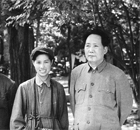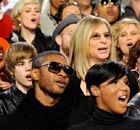Foreign and Military Affairs
China opposes Obama-Dalai meeting
By Tan Yingzi in Washington and Wu Jiao in Beijing (China Daily)
Updated: 2010-02-04 07:14
 |
Large Medium Small |
Simmering tensions between China and the United States since the beginning of the year were ratcheted up another notch yesterday, with Beijing warning Washington that a meeting between US President Barack Obama and the Dalai Lama would further sour ties between the two global powers.
Despite repeated protests, the White House confirmed on Tuesday that Obama would meet the Dalai Lama, whom Beijing considers a separatist.
Foreign Ministry spokesman Ma Zhaoxu yesterday said that China "resolutely opposes the leader of the United States having contact with the Dalai Lama under any pretext or in any form".
Ma was responding to claims that Obama had told Chinese leaders about the meeting during his November visit to China.
"During President Obama's visit, Chinese leaders had expressed firm opposition to leaders or officials of any country meeting the Dalai Lama," said Ma.
"We urge the US to fully grasp the high sensitivity of Tibet-related issues, to prudently and appropriately deal with related matters, and avoid bringing further damage to China-US relations."
According to AP, the Dalai Lama will be in Washington on Feb 17-18 and then head for California and Florida before returning to India on Feb 26.
Analysts said Beijing's ire at the White House announcement was predictable as it gets more assertive about its core concerns. It has, for the first time, announced unspecified sanctions against US firms involved in the Taiwan arms deal in addition to curtailing military exchanges and cooperation on a range of global and regional issues.
But it remains to be seen how far each country would go down that road, and when it is time to put the brakes as the two are in dire need of each other, analysts said.
"Beijing is sure to take some concrete measures to fight back, which are not clear so far. But the two sides must have weighed the consequences prior to announcing any measure," Niu Xinchun, an expert on US studies at the China Institutes of Contemporary International Relations, told China Daily.
When French President Nicolas Sarkozy would not pull out of a meeting with the Dalai Lama while his country held the rotating presidency of the European Union in 2008, China cancelled a summit with the EU, and there were calls from Chinese netizens for a boycott of French goods.
The Foreign Ministry's latest statement did not mention any specific retaliatory measure over Obama's planned meeting.
Yuan Peng, head of US studies at the China Institutes of Contemporary International Relations, was quoted by Reuters as saying the response from Beijing would be tougher than Washington anticipates.
"China wants to change the rules of the game," Yuan said. "Though the US has previously sold weapons to Taiwan and (previous US presidents have) met the Dalai Lama, and we've then railed at the United States, this time there'll be true cursing and retaliation."
Observers said Obama was under huge domestic pressure by critics at home for postponing a meeting with the Dalai Lama when the latter traveled to Washington last year, a break from previous presidents.
Obama is set to follow his predecessors in meeting the exiled figure to ease the huge political pressure on him as mid-term elections approach, Niu said.
Niu also added that there is a strong possibility that Obama will play the human-rights card for the mid-term elections, a vote-winning tactic that will please all sides.
But unlike Sarkozy, Obama is set to meet the Dalai Lama discreetly, Niu said.
Gong Li, director of the International Institute for Strategic Studies at the Central Party School, said China is not seeking a complete halt in bilateral relations, showing constraint in its retaliatory measures instead of reacting hysterically such as selling the US bonds.
"What China aims is to teach the US a lesson, and make it more conscious in dealing with China's core concerns. China certainly doesn't want a complete break-up with the US," Gong said.
Gong also said that the US may also be testing how far it could push China.
"If China didn't react strongly, F16s might be next on the arms sale list to Taiwan."
Ai Yang contributed to the story












